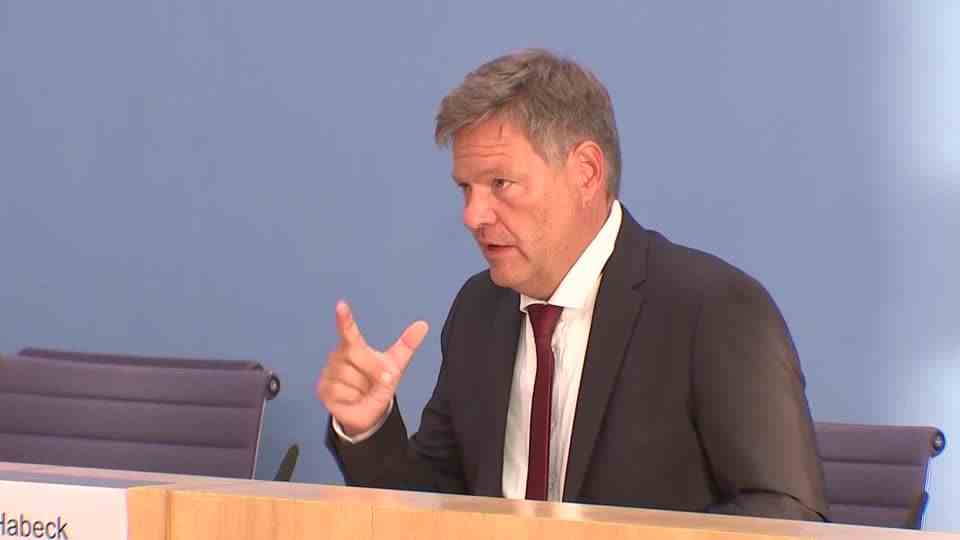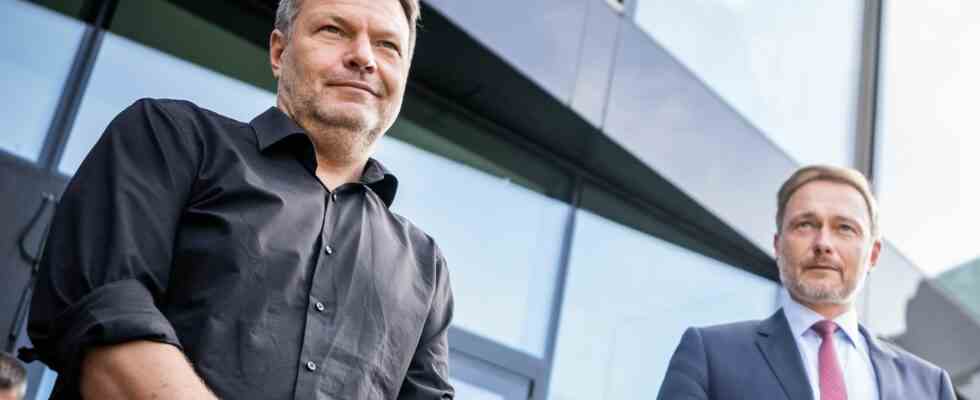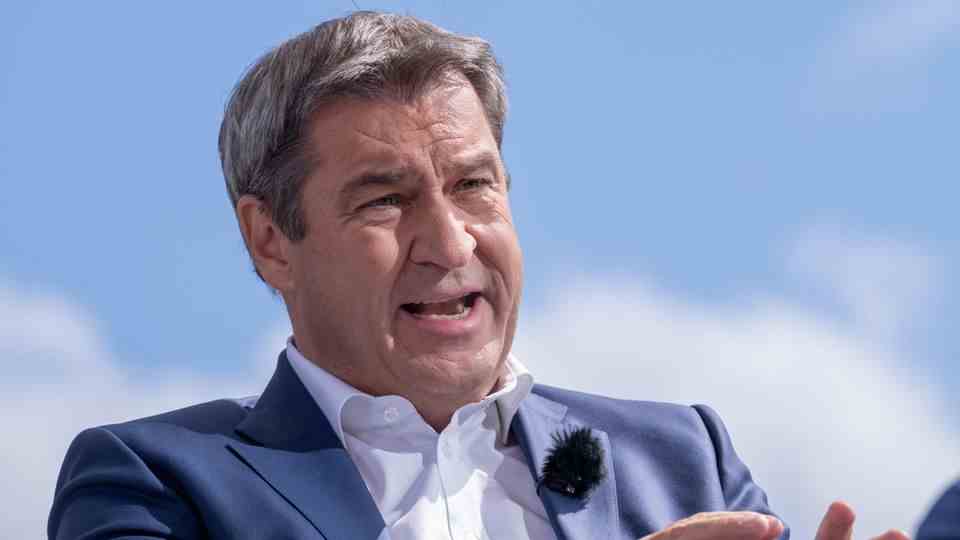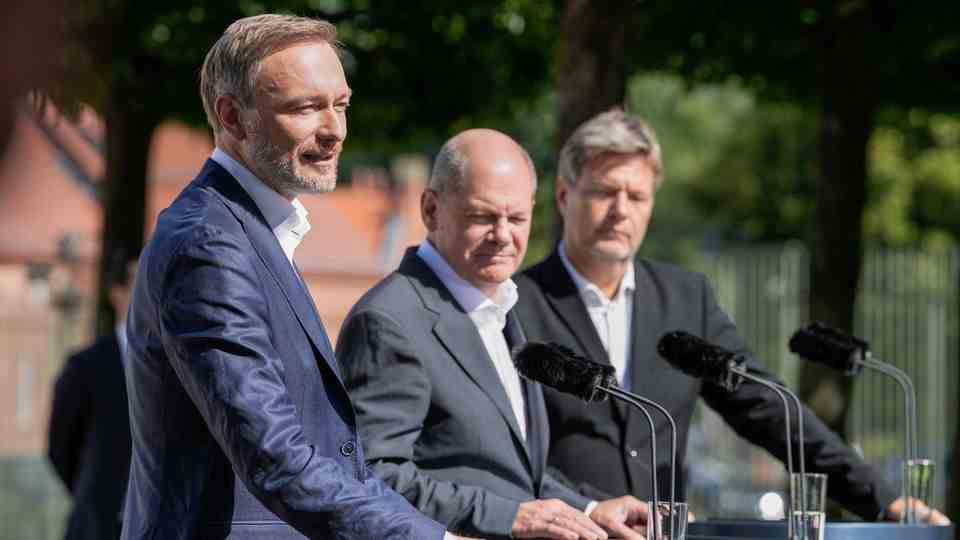analysis
nuclear power plant emergency reserve
Traffic light noise about nuclear energy: why the actual stress test is still to come
Federal Minister of Economics Robert Habeck (Bündnis 90/Die Grünen) and Federal Minister of Finance Christian Lindner (FDP)
© Michael Kappeler / DPA
Once again, the Greens and the FDP are crossed. The conflict with the potential for division will be fought shortly before the state elections in Lower Saxony. That shouldn’t be a coincidence.
Some call it so, others so. And that pretty much sums up the problem. The key question with the potential to split: nuclear power, no thanks or yes please?
- Federal Minister of Economics Robert Habeck (Alliance 90 / The Greens) says: “We have enough energy in Germany”. The nuclear phase-out will be adhered to. “New fuel elements will not be loaded and in mid-April 2023 the reserve will also be over.”
- Federal Minister of Finance and FDP leader Christian Lindner says: “In winter, some of our cities will be darker because we have to save electricity.” In this situation, nuclear energy should not be abandoned. “It takes more than just the stretching operation.”
In other words: the Greens and the FDP are once again crossed. At the moment, neither of the two parties to the conflict seems willing to move a crack from their position in the ongoing and ever-excited debate about nuclear energy. And the joint traffic light coalition with the SPD is thus heading for a massive conflict. But one by one.
The real stress test
The last three German nuclear power plants were scheduled to go offline at the turn of the year. In view of the energy crisis triggered by Russia and the war in Ukraine, not least the FDP fed the political discussion about the temporary continued operation of the reactors in order to prevent impending energy bottlenecks.
A push behind which the Greens could not gather. still in the spring, Habeck refused to extend the terman initial report from his Ministry of Economic Affairs and the Federal Ministry for the Environment by Steffi Lemke (Greens) had advised against continued operation: too little benefit with too great a risk.
But with the situation in the electricity sector getting worse, and probably under increasing pressure from the FDP, Habeck commissioned a second stress test in the summer. Result: Continued operation of the three remaining nuclear power plants is “another building block”, it says in the analysis commissioned by the power grid operatorscould make at least a limited contribution in critical situations.
This results in the actual stress test for the traffic light partners, as there is mainly dissent about the conclusions drawn from the result.
- Minister of Economics Habeck wants to keep two nuclear power plants – in Bavaria and Baden-Württemberg – in “operational reserve” until April 2023: The reactors should thus be switched on in an emergency. “New fuel elements are not loaded and in mid-April 2023 the reserve will also be over,” said Habeck on Monday when the stress test results were presented. The nuclear power plant in Lower Saxony should not continue to be operated. “The German energy supply is secure, we have enough energy and our grid is also secure,” added Habeck ARD “Daily Topics”. Crisis situations are unlikely, but you still play it safe.
- Federal Minister of Finance and FDP leader Lindner meanwhile calls for the continued operation of all three nuclear power plants “until at least the year 2024”. “In these times, all possibilities should be used to reduce the electricity price for people and companies,” said Lindner on Monday “Sueddeutsche Zeitung”. “Our cities are already dark. At the same time, we’re being told that we don’t have an electricity problem. That doesn’t make sense to me.” Lindner’s appeal to the coalition partners: “We also have to recognize that a very large majority of the population is now of the opinion that nuclear energy will make an important transitional contribution. People have concerns.”
in the ARD “Germany trend” in August a clear majority of Germans spoke out in favor of at least temporarily continuing to operate the remaining three nuclear power plants in Germany. That’s where the FDP comes in, trying to improve its political position in the traffic light coalition on the nuclear issue, says political scientist Thomas Jäger from the University of Cologne star.
“That should be the toad that the Greens would have to swallow”
“When the traffic light coalition was formed, all three parties hoped to be able to raise their own profile in the government once the pandemic had subsided,” said Jäger. Conflicts were foreseeable, as were the compromise areas. “Two developments have changed these compromise areas: Russia’s war against Ukraine and its energy policy consequences, and the different profiles of the parties.”
According to recent polls, the Greens are now the largest coalition partner (most recently 24 percent approval), the FDP remains the weakest (last 7 percent). “That changes the conversation,” says the expert. This can be seen from the example of the extension of the term.
The fact that a nuclear power plant should now be completely shut down is due to the upcoming state elections in Lower Saxony, just as the end of nuclear energy was due to the state elections in Baden-Württemberg in 2011, says the political scientist. “Both had little to do with a strategically designed energy policy for Germany as an industrial location,” says Jäger.
With a view to the security of supply and the development of electricity prices, it is incomprehensible why two nuclear power plants should remain on hold – but can be explained with a view to the intra-coalition decision-making process. “That should be the toad that the Greens would have to swallow,” says the political scientist. “Whereby Federal Minister Habeck decides whether this will happen at all.” Since the mood in German society is currently different than Habeck’s decisions, “the FDP has the opportunity to use this issue to improve its political position in the coalition by gaining more approval from the electorate.”
In October there are state elections in Lower Saxony, which could also provide conclusions about satisfaction with federal politics. According to recent polls The Greens could increase compared to the last election, while the FDP is largely stable – albeit in the single digits.
Even if Habeck does not have to fear any major party-political headwinds, the minister obviously prefers to explain the nuclear power plant shutdown to the public – instead of having to explain to the Green Youth that the electricity price is economically significant. “A majority of Greens voters were in favor of longer terms,” says political scientist Jäger, “but the idea that opposition within the party could be organized made those responsible shy away.”

Possibly also out of concern that an extension of the term could be too much for the party. The Greens already made far-reaching about-faces on the subject of arms deliveries to war zones or the reactivation of coal-fired power plants – also due to a lack of alternatives. A departure from the primal green anti-nuclear creed might have been the last straw.
“The FDP, which voted almost unanimously in 2011 to phase out the civil use of nuclear energy in Germany, can now only refer to the current crisis when it calls for lifetime extensions,” says Jäger.
Greens and FDP stick to their position
Neither of the two parties seems willing to move a crack from their position at the moment.
- “There will be no lifetime extension, no new fuel rods. We are sticking to the decision to phase out nuclear power,” he said Green co-boss Ricarda Lang the “Sueddeutsche Zeitung”. Two nuclear power plants are now ready for operation, according to co-boss Omid Nouripour. “After that it’s over,” he said on Tuesday ZDF “Morgenmagazin”.
- “The results of the stress test are worth little because the assumptions are too optimistic. They are politically determined and not derived from reality,” said the energy policy spokesman for the FDP parliamentary group, Michael Kruse. “The economics minister’s stress test smells like a state election campaign instead of affordable energy security for Germany,” said FDP General Secretary Bijan Djir-Sarai zur “Bild” newspaper.
So what’s left to hold onto? The Green Minister of Economics is struggling to allow two German nuclear power plants to continue operating – but that is far from enough for the FDP. The actual stress test is therefore likely to be yet to come.




